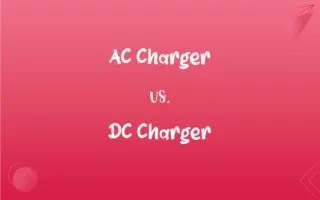Jail vs. Prison: What's the Difference?
Edited by Aimie Carlson || By Harlon Moss || Updated on October 9, 2023
Jail is a short-term holding facility, often for pre-trial detainees; prison is a long-term facility for those convicted of serious crimes.

Key Differences
Jail is a local detention facility primarily for those awaiting trial or serving short sentences. Prison, on the other hand, is a state or federal facility for people who have been convicted of felonies and are serving longer sentences.
In jails, individuals may be held temporarily until bail is posted, while in prisons, inmates are serving out a court-determined sentence.
Jails often have a more transient population, with inmates coming and going frequently. Prisons are designed for longer stays, and inmates typically remain there for years.
The primary purpose of a jail is to hold individuals until their court date. A prison's main function is to punish and rehabilitate individuals who have been found guilty of serious offenses.
While both jails and prisons are correctional institutions, jails are usually run by local law enforcement agencies, such as sheriffs or police departments. Prisons, conversely, are operated by state or federal agencies.
ADVERTISEMENT
Comparison Chart
Duration of Stay
Short-term, often days to months.
Long-term, often years to life.
Administration
Managed by local authorities.
Managed by state or federal government.
Population
Awaiting trial or serving short sentences.
Convicted of serious crimes.
Purpose
Detain individuals until court.
Punish and rehabilitate convicted offenders.
Facility Structure
Often smaller with limited facilities.
Larger with varied security levels.
ADVERTISEMENT
Jail and Prison Definitions
Jail
A facility for the confinement of individuals awaiting trial.
Tom was held in jail until his hearing.
Prison
A state or federal facility housing inmates serving extended sentences.
The maximum-security prison houses the most dangerous criminals.
Jail
An institution for the detention of persons sentenced for minor crimes.
After his DUI, he was sentenced to 30 days in jail.
Prison
An institution for punishing and rehabilitating convicts.
The state's new prison focuses on rehabilitation.
Jail
A temporary confinement facility.
His bail was set, and he hoped to be released from jail soon.
Prison
A facility for the long-term confinement of individuals convicted of major crimes.
After the trial, he was sent to prison for five years.
Jail
A place for short-term detention of misdemeanants.
She spent three days in jail for petty theft.
Prison
A place of captivity for those found guilty of felonies.
He was transferred to a different prison last year.
Jail
A local holding place for those taken into custody by police.
The officer took the suspect to the local jail for questioning.
Prison
A correctional facility for persons sentenced for serious offenses.
Her crime warranted a sentence in federal prison.
Jail
A place of detention, especially for persons who are accused of committing a crime and have not been released on bail or for persons who are serving short sentences after conviction of a misdemeanor.
Prison
A place for the confinement and punishment of persons convicted of crimes, especially felonies.
Jail
Detention in a jail.
Prison
A state of imprisonment or captivity
Years spent in prison.
FAQs
Are all prisons high-security facilities?
No, prisons vary in security levels from minimum to supermax.
Do jails have rehabilitation programs like prisons?
While some jails might offer programs, prisons tend to have more extensive rehabilitation services.
Are there educational opportunities in jail?
Some jails may offer basic programs, but prisons usually have more structured educational opportunities.
Who runs jails and prisons?
Jails are typically run by local authorities, while prisons are state or federally operated.
Can visitors see inmates in both jail and prison?
Yes, but visitation rules differ between jails and prisons and among individual facilities.
How do inmates get assigned to jail or prison?
The nature of the offense, the term of the sentence, and jurisdictional practices dictate the assignment.
Can a misdemeanor lead to prison time?
Typically, misdemeanors result in jail time, but repeated offenses or unique circumstances might lead to prison.
Can someone be bailed out of prison?
Bail is generally associated with jails and pre-trial release, not post-conviction prison stays.
Do jails and prisons both have infirmaries or medical facilities?
Yes, both jails and prisons have provisions for medical care, though the extent can vary.
Is the food the same in jails and prisons?
The quality and type of food can vary by facility and budget, regardless of jail or prison.
How long can someone be held in jail before trial?
It varies by jurisdiction, but there are often laws to ensure timely trials.
Are there private prisons but no private jails?
There are both private prisons and jails, but their prevalence and operation depend on jurisdiction.
Can someone serve a long sentence in jail?
Generally, jails are for shorter sentences, but some exceptions might occur based on jurisdiction.
Can a person be transferred from jail to prison?
Yes, after conviction, a person can be transferred from jail to serve their term in prison.
Which is larger in capacity, a jail or a prison?
Prisons are generally larger and designed for long-term confinement.
Do prisons only house violent criminals?
No, prisons house individuals convicted of various crimes, not just violent ones.
Are juvenile offenders sent to jail or prison?
Juveniles are typically held in separate facilities, neither regular jails nor prisons.
What's the primary difference between jail and prison?
Jail is for short-term, often pre-trial, detention; prison is for long-term confinement post-conviction.
Do both jails and prisons have solitary confinement?
Yes, both can have solitary confinement, but its usage and conditions can vary.
Are jails only for those who've committed minor offenses?
No, jails also hold individuals awaiting trial, regardless of the severity of the alleged offense.
About Author
Written by
Harlon MossHarlon is a seasoned quality moderator and accomplished content writer for Difference Wiki. An alumnus of the prestigious University of California, he earned his degree in Computer Science. Leveraging his academic background, Harlon brings a meticulous and informed perspective to his work, ensuring content accuracy and excellence.
Edited by
Aimie CarlsonAimie Carlson, holding a master's degree in English literature, is a fervent English language enthusiast. She lends her writing talents to Difference Wiki, a prominent website that specializes in comparisons, offering readers insightful analyses that both captivate and inform.






































































